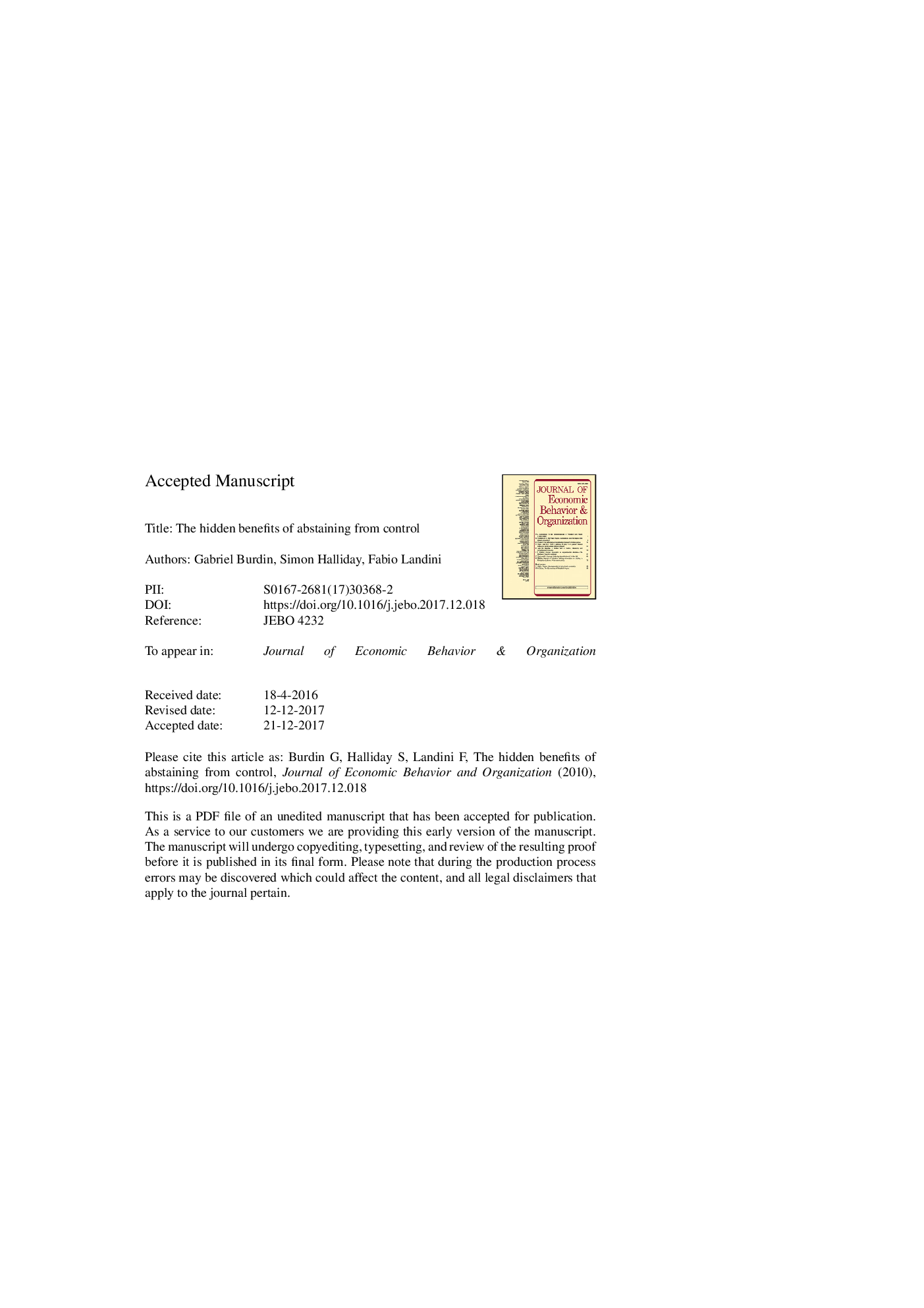| کد مقاله | کد نشریه | سال انتشار | مقاله انگلیسی | نسخه تمام متن |
|---|---|---|---|---|
| 7242639 | 1471620 | 2018 | 28 صفحه PDF | دانلود رایگان |
عنوان انگلیسی مقاله ISI
The hidden benefits of abstaining from control
ترجمه فارسی عنوان
مزایای پنهان از عدم کنترل
دانلود مقاله + سفارش ترجمه
دانلود مقاله ISI انگلیسی
رایگان برای ایرانیان
کلمات کلیدی
ترجمه چکیده
در این مقاله نقش نقش متقابل منفی، متقابل مثبت و ترجیحات برای خودمختاری در توضیح واکنش های عوامل به کنترل در بازی های اصلی بازیگری تجربی بررسی شده است. در حالی که بیشتر ادبیات روانشناسی اجتماعی بر نقش خودمختاری تأکید می کند، تحقیقات اخیر اقتصادی پیشنهاد متقابل متفاوتی را ارائه کرده است. برای درک مکانیسم های رفتاری که این واکنش ها را تحت تأثیر قرار می دهند، ما یک آزمایش انجام می دهیم که در آن دو تست را مقایسه می کنیم: یکی که در آن کنترل به طور مستقیم توسط اصل اعمال می شود؛ و دیگری که توسط یک شخص ثالث مورد استفاده قرار می گیرد و از هیچ گونه حقوق درخواستی باقیمانده (کنترل شخص ثالث) برخوردار نیست. نتایج نشان می دهد که زمانی که شخص اصلی یا شخص ثالث تصمیم به کنترل سطح متوسط تلاش می کند که توسط عوامل انتخاب شده است، مشابه است. آنچه که تغییر قابل توجهی می کند واکنش نمایندگان به تصمیم شرکت کنندگان دیگر نیست که کنترل کنند. هنگامی که مدیر تصمیم به کنترل ندارد، نماینده تلاش بیشتری نسبت به موردی که شخص ثالث تصمیم به کنترل ندارد، اعمال می کند. به نظر می رسد نمایندگان به مدال هایی که از کنترل اعتماد خود عقبنشینی می کنند، پاداش می دهند، به جای آن که مجازات آنها را برای عدم اعتماد آنها کنترل کند.
موضوعات مرتبط
علوم انسانی و اجتماعی
اقتصاد، اقتصادسنجی و امور مالی
اقتصاد و اقتصادسنجی
چکیده انگلیسی
This paper studies the role of negative reciprocity, positive reciprocity and preferences for autonomy in explaining agents' reactions to control in experimental principal-agent games. While most of the social psychology literature emphasizes the role of autonomy, recent economic research has provided an alternative explanation based on reciprocity. To understand the behavioral mechanisms underlying such reactions, we conduct an experiment in which we compare two treatments: one in which control is exerted directly by the principal; and the other in which it is exerted by a third party enjoying no residual claimancy rights (third-party control). The results indicate that when either the principal or a third party decides to control the average level of effort that is selected by the agents is similar. What changes remarkably are the agents' reactions to the decision of the other participants not to control. When the principal decides not to control, then the agent exerts greater effort relative to the case when the third party decides not to control. Agents seem to reward principals who abstain from control for their trust, rather than punish controlling ones for their distrust.
ناشر
Database: Elsevier - ScienceDirect (ساینس دایرکت)
Journal: Journal of Economic Behavior & Organization - Volume 147, March 2018, Pages 1-12
Journal: Journal of Economic Behavior & Organization - Volume 147, March 2018, Pages 1-12
نویسندگان
Gabriel Burdin, Simon Halliday, Fabio Landini,
